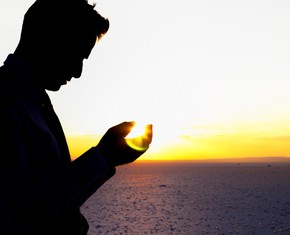The views expressed in our content reflect individual perspectives and do not represent the authoritative views of the Baha'i Faith.
The Baha’i interpretation of prophecies about the “end-times” differs significantly from what synagogues, churches, and mosques have taught for centuries.
In the Baha’i teachings, the Day of Resurrection will not supernaturally destroy human society; or result in the end of the world; or create a physical apocalypse. Instead, it signifies the arrival of a new divine message about how to advance civilization, improve our communities, and make the most of our life upon this Earth. It won’t take place in the future—or, at least, it won’t anymore. That’s because Baha’is believe that that process was initiated over a century and a half ago by the Bab and Baha’u’llah, the two divinely chosen-figures whose appearance in the world marks the beginning of the Baha’i Faith.
When I came to believe in the truth of this new message, my heart and mind were overwhelmed by the gravity of its significance. It flew in the face of what I thought my Christian beliefs meant. But as I became a follower of the Baha’i Faith I found great joy in it. At that time, I especially cherished these words of Jesus to his disciples:
Blessed are the eyes that see what you see, for I tell you that many prophets and kings wanted to see what you see, and never saw it; to hear what you hear and never heard it. – Luke 10.23
A century before I heard about it, this joy especially filled the hearts of early Baha’is living in Persia at the time of the Bab and Baha’u’llah. Not only did they see themselves as living at a time when God was fulfilling promises he had made centuries ago; they also had the opportunity to start transforming society and their relationships with others in light of what God had revealed through his new prophets.
One story from that time illustrates this theme, and the enormous shift in mindset it produced among some of the Persian people. It’s about a man named Abdu’l-Qani, and a new acquaintance named Ardashir, and has to do with this well-known end-times prophecy in the Bible:
The wolf and the lamb will feed together, and the lion will eat straw like the ox, and dust will be the serpent’s food. They will neither harm nor destroy on all my holy mountain, says the Lord. – Isaiah 65:25.
In The Book of Certitude, Baha’u’llah states that this prophecy refers to the power of God’s guidance to help people achieve peace and overcome strife and oppression:
How numerous are those peoples of divers beliefs, of conflicting creeds, and opposing temperaments, who, through the reviving fragrance of the Divine springtime, breathing from the Ridvan [Paradise] of God, have been arrayed with the new robe of divine Unity, and have drunk from the cup of His singleness!
This is the significance of the well-known words: “The wolf and the lamb shall feed together.” – pp. 103-104.
Here’s the story, set in the late 1800s in the Central Iranian province of Yazd:
Mulla Abdu’l-Qani of Ardikan, who was a well-known and much respected priest before he became a Baha’i, was still clothed in the garments of the Muslim clergy when Ardishir, a young Zoroastrian, was taken to his house to hear about the new Faith.
The Zoroastrians of Persia, having suffered all forms of insults and indignations at the hands of the Muslims, especially dreaded meeting with any of the clergymen of Islam as this group never failed to poison the life of a Zoroastrian whenever they set eyes on one of them. Ardishir, therefore, had grave misgivings when he found his host to be dressed in the robes of the dreaded enemy. But he was soon to find out that this man was entirely different from any Muslim priest he had yet seen or heard of.
As soon as the young guest arrived at the threshold of his room, Abdu’l-Qani rose to his feet in respect and courteously offered him a seat beside himself. He then proceeded to pour out a glass of tea for him with his own hands. The young man was greatly astonished. He could not imagine that it could be possible for a Muslim priest to undergo such transformation even if he had become a Baha’i. Not only did the Muslims treat Zoroastrians with great contempt, but it was impossible for them to permit a Zoroastrian to drink out of a glass used in their own home. All Zoroastrians were considered as unclean and no Muslim would dream of using a receptacle defiled by them.
The greatest surprise came for Ardishir, when after he had finished drinking the tea, his host deliberately filled the same glass again, without pouring out what was left inside, and began to drink from it. Then, turning to the young Zoroastrian, he remarked: “You must have heard how, in the days of the advent of the Promised Lord, the lamb and the wolf will drink from the same stream and graze in the same meadow. Do you still doubt that we are living in that Day?” – Gloria Faizi, Fire on the Mountaintop, pp. 23-24.
Abdu’l-Qani could see the glorious potential of the new spiritual era in which they both lived. And through his words and deeds he awakened his guest to an empowering vision of social and spiritual transformation.
















Comments
Sign in or create an account
Continue with Googleor